<< Previous | Displaying results 5101-5110 of 6772 for "" | Next >>
This picture, taken in 2004, shows Blanka Rothschild holding one of her prewar family photographs.
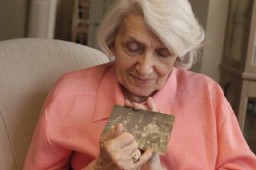
Blanka was an only child in a close-knit family in Lodz, Poland. Her father died in 1937. After the German invasion of Poland, Blanka and her mother remained in Lodz with Blanka's grandmother, who was unable to travel. Along with other relatives, they were forced into the Lodz ghetto in 1940. She and her mother were deported to the Ravensbrueck camp in Germany in 1944. From Ravensbrueck, Blanka and her mother were sent to a subcamp of Sachsenhausen. Blanka was forced to work in an airplane factory…
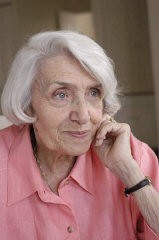
Photograph of Blanka Rothschild taken in 2004. Blanka was an only child in a close-knit family in Lodz, Poland. Her father died in 1937. After the German invasion of Poland, Blanka and her mother remained in Lodz with Blanka's grandmother, who was unable to travel. Along with other relatives, they were forced into the Lodz ghetto in 1940. She and her mother were deported to the Ravensbrueck camp in Germany in 1944. From Ravensbrueck, Blanka and her mother were sent to a subcamp of Sachsenhausen. Blanka…
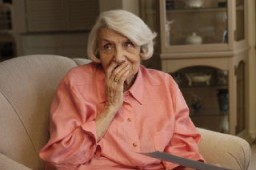
Blanka Rothschild and Neenah Ellis look through Blanka's photograph albums. Photograph taken in 2004.
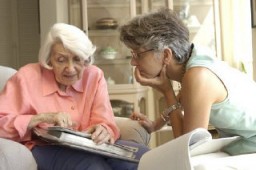
This 1925 photograph taken in Kolbuszowa, Poland, shows Norman Salsitz (at right) with his sister Rachel (left) and brother David (center). With the end of World War II and collapse of the Nazi regime, survivors of the Holocaust faced the daunting task of rebuilding their lives. With little in the way of financial resources and few, if any, surviving family members, most eventually emigrated from Europe to start their lives again. Between 1945 and 1952, more than 80,000 Holocaust survivors immigrated to…
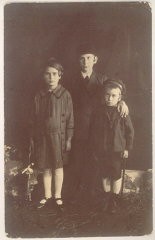
Prewar portrait of Norman's parents, Isak and Ester, taken in Kolbuszowa, Poland, in 1934 when Isak's brother visited from America. Isak's six siblings all emigrated to America. Isak and Esther, who remained in Kolbuszowa, both perished during the Holocaust: Isak was killed in the Kolbuszowa ghetto on April 28, 1942, and Esther was killed in the Belzec killing center in July 1942. With the end of World War II and collapse of the Nazi regime, survivors of the Holocaust faced the daunting task of…
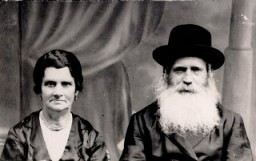
This 1929 portrait shows Norman Salsitz with his niece, Szandla Weinstein. Picture taken in front of a photographer's backdrop in the Kolbuszowa marketplace.
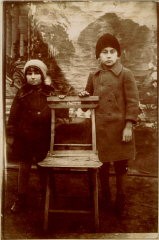
Norman's sisters Malcia, Matla, and Rachel eat bagels in the doorway of their mother's store. The red and white stripes on the door frames indicate that the store carried cigarettes, matches, and sugar, consumer goods regulated by a state monopoly. Kolbuszowa, Poland, 1934. With the end of World War II and collapse of the Nazi regime, survivors of the Holocaust faced the daunting task of rebuilding their lives. With little in the way of financial resources and few, if any, surviving family members, most…
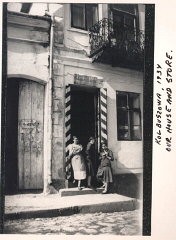
In this 1934 portrait of Norman Salsitz's family, Norman is seated in the front row (at left). In the top row, center, an image of one of Norman's brothers has been pasted into the photograph. This is seen by comparing the size of the brother's face with the others pictured. Pasting in images of family members who could not be present during family portraits was common practice and in some cases the resulting composite images are the only remaining visual records of family groups.
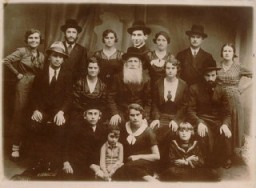
Four of Norman's sisters, the maid, and Norman's mother, Esther, do laundry in the yard of their home. Kolbuszowa, Poland, 1934.
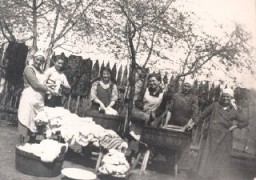
We would like to thank Crown Family Philanthropies, Abe and Ida Cooper Foundation, the Claims Conference, EVZ, and BMF for supporting the ongoing work to create content and resources for the Holocaust Encyclopedia. View the list of donor acknowledgement.